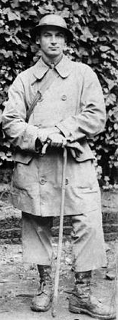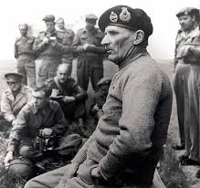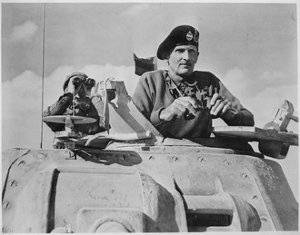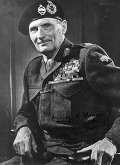British General Bernard Montgomery
Bernard Montgomery was one of the United Kingdom's most famous military commanders. A brilliant strategist, "Monty" won a key battle in North Africa, defeating the celebrated German field marshal Erwin Rommel, and then led the Allied invasion of D-Day in 1944. 
Montgomery was born in Kennington, Surrey, on November 1887. His family lived in Tasmania for a time before returning to England in 1901. Montgomery attended St. Paul's School in London. He first attended the Royal Military Academy at Sandhurst when he was 20. He left with a commission of lieutenant of infantry. Montgomery served in India for a time and then fought in World War I. He was wounded in the chest (twice, once in the lung) and in the knee after leading a bayonet charge at the First Battle of Ypres in October 1914. He was a staff officer for the rest of the war. 
He stayed in the British Army after World War I, serving in Egypt and Indian and Palestine, and rose through the ranks. His mantra was preparedness, and he trained his troops hard and often. One of his more famous quotes was this: "Discipline strengthens the mind so that it becomes impervious to the corroding influence of fear." Montgomery had married, in 1927, to a woman named Betty Carver, whose husband had died in World War I and left behind two children. Bernard and Betty had a son together. Betty died in 1937, as a result of an infection stemming from an insect bite. Montgomery was holding her when she died, and he battled his devastation by throwing himself back into his work. He was named commander of the British Expeditionary Force 3rd Division in 1939 and was among those who retreated to Dunkirk for a desperate rescue. He spent the next two years training British forces in England. 
In October 1942, he arrived in North Africa to head up the Eighth British Army, which had suffered greatly at the hands of the vaunted Afrika Corps led by Germany's Field Marshal Erwin Rommel. But Montgomery fell back on his training maxim and got the better of Rommel at the Second Battle of El Alamein in 1942. Montgomery continued to press the advantage, and Rommel left North Africa in March 1943. Montgomery took part in the Tunisian offensive that drove the Axis out of North Africa in May. Also in that year, Montgomery led a group of troops on an invasion of Italy. He and American General George Patton engaged in a spirited invasion of Sicily, with Patton's 7th Army reaching the target, Messina, just before Montgomery's 8th Army did. Montgomery continued on into Italy proper and captured a set of important airfields in October. Montgomery's successes in North Africa and Italy earned him the role of lead commander for the Allied ground troops on D-Day. Dwight D. Eisenhower, the Supreme Commander of the Allied Powers, named Montgomery the commander of the 21st Army Group, which contained all of the ground forces that would try to get ashore on the beaches of Normandy on June 6. The landings were, by and large, a success. Montgomery led a spirit breakout from the Cherbourg Peninsula and through Belgium and the Netherlands. He was named field marshal in August 1944 and given command of all British and Canadian troops. Just one month later, Montgomery directed the largest airborne attack of the war, a split offensive known as Operation Market Garden that involved airborne landings targeting a number of bridges in the Netherlands and a large army assault, with the shared goal of seizing Arnhem. The operation didn't go as planned, and Montgomery suffered a rare defeat. A quick end to the war was no longer in sight, but Allied troops did liberate the south part of the Netherlands. Montgomery led a contingent of troops responding to Germany's surprise counteroffensive known as the Battle of the Bulge. He led his troops across the Rhine River in March 1945 and sealed off Germany's prized Ruhr industrial area. He received the German northern armies' surrender on May 4. He was commander of the British occupation forces and the Army of the Rhine, in 1945–1946. Montgomery served as chief of the British Imperial Staff after World War II. He was deputy commander of NATO from 1951 to 1958. He retired and wrote his memoirs, which were published in that same year. He also wrote a few other books, including El Alamein to the River Sangro, Normandy to the Baltic, The Path to Leadership, and A History of Warfare. He died in 1976 at his home near Alton, Hampshire. 
Montgomery was known for his meticulous preparation before a battle and for his success in the field. An eyewitness to the horrendous and voluminous casualties during World War I, he became known in World War II as a cautious commander (and this caution ran him afoul of American commanders in the days after the Normandy landings). He had a high opinion of himself and was not afraid to share it with others. Many would argue that his battlefield success largely validated this opinion. Among his many honors were receiving the Distinguished Service Order (for his service in World War I) and being named a Knight of the Garter and Viscount of Alamein. |
|




